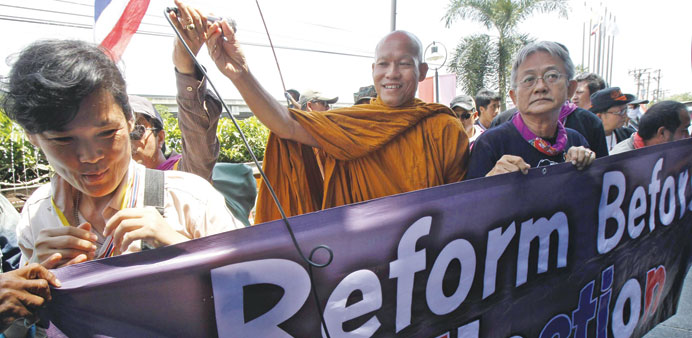AFP/Bangkok
Talks between Thailand’s quarrelling political parties on a roadmap to elections following months of deadly political turmoil ended with no breakthrough yesterday after the opposition pulled out at the last minute.
Prime Minister Yingluck Shinawatra is pushing for new polls as soon as possible to bolster her precarious position in the face of a series of legal threats that could force her from office.
The kingdom has been without a fully functioning government or parliament since December, and a general election held in February was voided after opposition demonstrators disrupted voting.
The nation has been shaken by months of political violence that has left 25 people dead and hundreds wounded, including many anti-government protesters, in grenade attacks and shootings.
The Election Commission (EC) called the talks to discuss a new election date with political rivals including the main opposition Democrat Party, which boycotted the last round of voting.
But a day after describing the talks as “the most opportune time to put aside our party views”, Democrat Party leader Abhisit Vejjajiva announced shortly before the meeting began that he would not be going.
“I will not attend the meeting because of security,” he said without specifying the nature of the concerns. “No one from the Democrats will attend.”
Representatives of more than 50 other political parties joined the talks, according to election officials. On the eve of the meeting, Yingluck’s Puea Thai Party decried a “conspiracy” by her opponents to thwart new polls.
In a statement the party said certain groups and political parties “don’t want democracy” and are trying to create a political vacuum so they can appoint their own unelected leader.
The EC — which has been accused by government supporters of siding with the opposition — says it needs several months at least to organise new polls, leaving the country in legislative limbo.
During the talks election officials proposed three possible voting dates — July 20, August 17 or September 14 — but denied that they were deliberately stalling.
“We chose that to have a successful election, not to delay it in the hope of waiting for something to happen or as part of a conspiracy theory,” said Somchai Srisutthiyakorn, one of the election commissioners.
The meeting ended after several hours with a pledge by the EC to discuss the election date with the government.
Yingluck, who won a landslide election victory in 2011, could be ordered to step down within weeks in connection with two legal cases under consideration by the Constitutional Court and an anti-corruption panel.
Thailand’s first female premier is accused of the alleged improper transfer of a top civil servant as well as dereliction of duty linked to a loss-making rice subsidy scheme that critics say is infested with corruption.
Her supporters see the moves as an attempted power grab.
The backdrop is an eight-year struggle between a royalist establishment — backed by parts of the judiciary and the military —and Yingluck’s family, which has traditionally enjoyed strong support in the northern half of Thailand.

Thai Buddhist monk and protest leader Luang Pu Buddha Issara gestures as his supporters hold a banner during a rally outside a hotel in Bangkok yester
